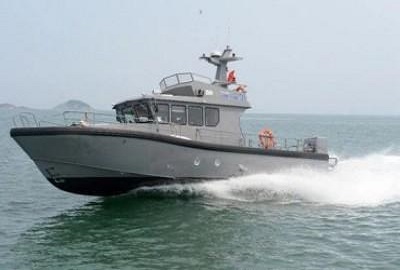Aluminum alloy has been used in the shipbuilding industry for nearly a hundred years. With the rapid development of the shipbuilding industry at home and abroad, the lightweight of ships has been paid more and more attention. Due to the low density, high strength, high rigidity, and corrosion resistance of aluminum, ships built with aluminum by ship designers have reduced weight by 15-20% compared to ships built with steel or other synthetic materials. The high toughness, corrosion resistance, and weldability of aluminum alloy provide a good choice for building ships with strict weight requirements. Because aluminum has a lower processing cost, it is more economical to use aluminum to make ships. Aluminum alloy can be used as a plate, and it can also be extruded and cast. Coupled with the outstanding physical properties of aluminum alloy, it is very economical to use aluminum alloy to make ships. From the perspective of ship designers, ships made of aluminum alloys can achieve higher speeds and longer service lives. These advantages of aluminum alloys make it rapidly develop in ship applications. The shipbuilding industry is aluminum Provides a broad application market.

1. High specific strength and specific modulus
The yield strength and elastic modulus of the material are the most basic parameters for calculating the strength of the ship structure and determining the size of the structure. Since the elastic modulus and density of various aluminum alloys are roughly the same, and adding a small amount of alloying elements or changing the heat treatment state has little effect on them, increasing the yield strength within a certain range is beneficial to reducing the weight of the ship structure. Generally, aluminum alloys The density is about 2.7~2.8/cm3, and the elastic modulus is about 70~73GPa. However, it is usually difficult for high-strength aluminum alloys to have excellent corrosion resistance and weldability at the same time. Therefore, ship aluminum alloys are generally welded with medium strength and corrosion resistance. In addition, cast aluminum alloys also have certain applications in the shipping field.
2. Excellent welding performance
For ships, the welding connection has obvious advantages over the riveting connection. Therefore, the welding connection method has been widely used in shipbuilding and basically replaced the riveting structure. At present, the automatic argon arc welding method is mainly used in the construction of aluminum ships. The good weldability of aluminum alloy means that the tendency of cracks formed during welding of aluminum alloy is smaller, that is, aluminum alloy has good welding crack resistance, and the performance of the welded joint after welding does not change much. Because under the conditions of shipbuilding, the performance lost by welding cannot be restored by reheating, this is one of the important characteristics of ship aluminum alloy which is different from other structural aluminum alloys. The strength of the AL-Zn-Mg series and AL-Mg-Si series alloys is significantly reduced after welding, and the corrosion resistance of AL-Zn-Mg series alloys after welding is also poor. Therefore, the two series alloys are subject to certain restrictions when used as welding marine materials.
3. Excellent corrosion resistance
Ship structures are mostly used in harsh seawater media and marine environments, so whether aluminum alloys are corrosion resistant is one of the main signs that determine whether they can be used as marine aluminum alloys. It is generally required that the substrate and welded joints of Ship aluminum alloy have no tendency of stress corrosion, spalling corrosion, and intergranular corrosion in seawater and marine environment. Try to avoid contact corrosion, crevice corrosion and marine organisms attached corrosion; allow smaller uniform corrosion and pitting corrosion.
4. Good cold and hot forming properties
During the construction process, the ship must undergo cold processing (such as hemming, curling, roll bending, stamping, etc.) and thermal processing (such as hot bending, pyrotechnics, etc.). Therefore, the marine aluminum alloy is required to be easy to process and form, without cracks and other defects during processing, and still meet the performance requirements such as strength and corrosion resistance after processing.
